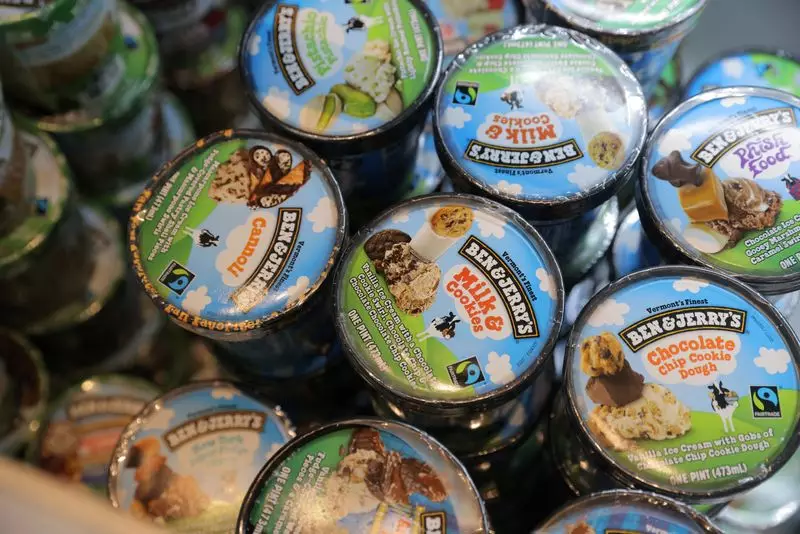In a notable legal dispute that highlights the complexities underlying corporate and ethical responsibilities, Ben & Jerry’s has initiated a lawsuit against its parent company, Unilever. This legal action, lodged recently, marks a critical intersection of business, ethics, and geopolitical concerns. Ben & Jerry’s claims that Unilever is stifling its efforts to publicly support Palestinian refugees and threatening to dismantle its independent board. The lawsuit escalates existing tensions that resurfaced after Ben & Jerry’s decision to halt sales in the Israeli-occupied West Bank—a decision motivated by the company’s social commitment.
The conflict between the two entities began in 2021 when Ben & Jerry’s made headlines by announcing its intention to stop selling ice cream in the West Bank, highlighting the inconsistency with its social mission. This stand resonated with a portion of its customer base but drew ire from others, including investors. Following widespread backlash, Unilever faced significant pressure and some investors chose to divest their shares, showcasing the financial ramifications of such socially charged decisions. The subsequent lawsuit that emerged over Unilever’s sale of its franchise in Israel further complicated their relationship, culminating in a settlement in 2022 that was intended to provide a resolution.
Yet, as indicated by the latest legal maneuvers, the agreement may not have effectively fostered peace between the two parties. Ben & Jerry’s alleges that Unilever has violated the settlement by failing to recognize the independent board’s role in upholding the company’s social mission, leading to accusations of corporate overreach in matters of social conscience.
As the lawsuit unfolds, Ben & Jerry’s articulated its efforts to advocate for various humanitarian causes, indicating that it has attempted on four distinct occasions to express its support for peace and human rights. However, these attempts were allegedly met with resistance from Unilever, which purportedly silenced the company’s voice on subjects such as the humanitarian crisis in Gaza and military aid to Israel. The gravity of such a corporate intervention raises questions about the limits of expression within large organizations and the chilling effect it has on subsidiary entities with distinct ethical commitments.
The lawsuit claims that Unilever’s corporate leadership expressed concerns about potential backlash, citing a fear of being perceived as anti-Semitic for their stance on the issue. This friction between ethical advocacy and corporate governance underscores a broader dichotomy within today’s business practices, where brands are increasingly expected to take a stand on moral issues.
Founded in 1978 by Ben Cohen and Jerry Greenfield, Ben & Jerry’s has consistently branded itself as an entity committed to social justice and progressive values. Even after its acquisition by Unilever in 2000, the company has maintained its ethos, often aligning its marketing strategies and community engagement activities with social causes. This lawsuit not only highlights the internal struggles that can arise when corporate interests collide with social missions but also serves as an emblem of the broader conflict many socially conscious businesses face in an increasingly politicized world.
Under the terms of their 2022 settlement, Unilever was also tasked with making substantial financial contributions to allow Ben & Jerry’s to support human rights organizations of its choosing. However, Unilever’s objections to the selection of beneficiaries—criticizing organizations like Jewish Voice for Peace as “too critical of the Israeli government”—illustrate the deep complexities surrounding corporate philanthropy, particularly in politically charged contexts.
As Unilever prepares to spin off its ice cream division by the end of 2025, uncertainty looms over the future of Ben & Jerry’s and its ability to engage meaningfully with social issues. Will this separation afford the ice cream maker greater autonomy in pursuing its social mission, or exacerbate existing conflicts? The legal landscape is evolving, and the outcomes could reshape the dialogue surrounding corporate responsibility and ethical engagement in an age where consumer expectations are rapidly changing.
In examining this unfolding story, it becomes apparent that the intersection of corporate governance, ethical commitments, and social activism is a growing frontier that demands careful navigation. Ben & Jerry’s current legal struggle reveals the fundamental tensions inherent in balancing profitability with principled advocacy, challenging the traditional paradigms of how businesses operate in society today.

